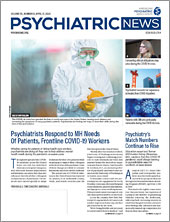This is my last column as your president. When I first considered running for office, one of my major worries was whether I was up to the challenge of writing a column for Psychiatric News every two weeks even though I relished the idea of sharing thoughts with you on a regular basis. Fortunately, it turned out to be a much less onerous task than I had imagined. There was much to write about. In fact, I can now say that there is too much to write about as our nation and members attempt to cope with the personal and professional stress of caring for patients anxious about becoming infected with coronavirus, trying to protect our own safety, social distancing, and the closing of so many institutions and businesses.
At the Board of Trustees meeting on March 14, the Board concluded that in light of the coronavirus health emergency and government actions in Philadelphia, we could not hold the 2020 APA Annual Meeting. Many members depend on the Annual Meeting to earn their CME credits, sharpen their clinical skills, and learn about new research findings, but the meeting is so much more than that. It’s a celebration and a “gathering of the tribe” where we connect with colleagues from all over the United States and many countries throughout the world. Dr. Phil Muskin and members of the Scientific Program Committee had put together a truly outstanding program, and many individuals had worked hard to prepare high-quality submissions. The Board’s conclusion was painful, but the right one given the health risks that we knew would increase over the coming weeks and months and the need for our members to be at home caring for patients and being involved in the public health response.
In this final column I do not want to review my past year as president given the recent stresses and changes in our day-to-day lives. I tend to be an optimist and see the important lessons that are emerging from this epidemic. It has shown us that many health systems do not have the equipment, supplies, and other resources needed to care for patients effectively and safely during a crisis and that too many hospitals are financially stressed, which is interfering with their response. With regard to mental health issues, we are seeing the importance and value of telepsychiatry. We have to continue fighting for resources to respond to the needs of people with mental illness. It is imperative that we meet the needs of people who are out of work or ill or require quarantine.
Fortunately, among our members and staff, there is phenomenal expertise in dealing with disasters, which has allowed us to effectively begin to tackle these issues. Dealing with this crisis requires multidisciplinary teams with all professionals functioning at the maximum of their training and expertise. I watched a story on television about the public health nurses in Westchester County, N.Y., who had the task of visiting and monitoring individuals in their homes with COVID-19 infections. What bravery and selflessness it takes to jeopardize one’s own health and well-being in service to others. The physicians, nurses, physician assistants, and technicians working on the front lines caring for these patients deserve our recognition and gratitude.
So as I say farewell for now, I hope everyone stays well. I know we will continue to do all we can to help our patients, family, friends, and colleagues weather this storm. It has been my great honor to serve as your APA president. See you at next year’s Annual Meeting! ■

